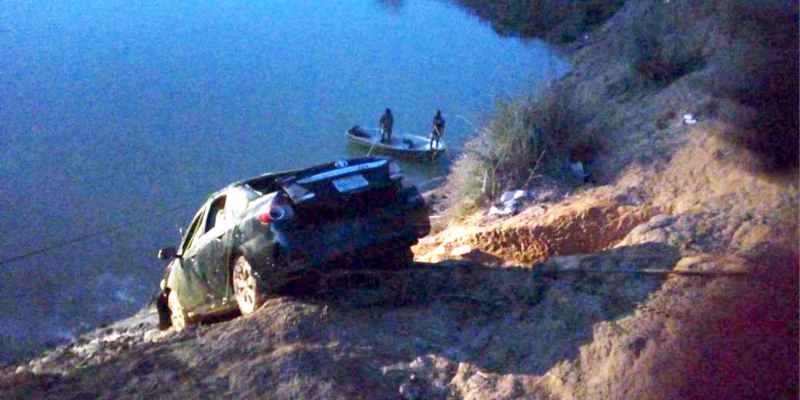Plateau pond of blood: A metaphor of elite recolonisation of Nigeria
The Plateau pond of blood is a sad metaphor of the huge pond of blood that has become the reality of our national life. Nigeria has become a huge island; not of water but an island of ponds of blood. The Plateau ponds dotting the landscape of Plateau State, were of course, not created by […]

A vehicle belonging to General Idris Alkali (rtd) being winched from Jos pond yesterday
The Plateau pond of blood is a sad metaphor of the huge pond of blood that has become the reality of our national life. Nigeria has become a huge island; not of water but an island of ponds of blood. The Plateau ponds dotting the landscape of Plateau State, were of course, not created by the natives. The Plateau natives, just like all other natives, were historically, victims, whose fates have undergone a strange phenomenal metamorphosis from victimhood to culprit-hood (permit the diction) on account of elite manipulations into fighting proxy wars.
The history of Plateau ponds is a history of British foreign expansionism euphemistically dubbed, “colonization” of Nigeria; an expansionism not driven by any values of humanity but bed-rocked solely on the greedy quest for exploitation of the nation’s abounding natural resources. One of such resource exploitation, of the many natural endowments buried deep in the bowel of nation’s famous Plateau, gave birth to the many ponds dotting the landscape of Plateau State. The yawning mine pits negligently left behind by the exploitative mining activities of the colonial days now serve other unintended purposes.
Many may not be aware that the beginning of colonial government exploitation of the country’s natural resources was also the beginning of the history of blood; of wanton deaths by preventable accidents at the mines; of many more deaths of natives by outright murder resulting from local resistance of the colonial inhumanity; and worse, the beginning of seed of death sprouting from the very many fractured legacies of oppression and exclusion, the two mortal inheritances left behind by the colonial masters for successive servants-turned elites in the wake of Nigeria’s independence.
The successive servant-elites of the colonial masters have successfully lived up to their calling of advancing the cause of their inherited legacies; the cause of oppression, of exploitation and exclusionism, nurtured by bloodletting and sustained even by more blood of the innocent, whose nomenclatures change with the change of baton of power. With the colonial masters, they bore the nomenclatural identity of natives. Now, with the elites in control, comes another change of identity to the “locals”. The resources are no longer limited to the natural endowment. The elite scramble for partition is now done on the sharing table of political intrigues.
The ensuing elite fight from their conflicting interests in the scramble for partition of the national resources is what has now morphed into, and dressed up, as tribal, ethnic, clannish and religious agitations bedevilling the nation, resulting in the very many ponds of blood dotting the nation’s landscape.
Unknown to the uninitiated, at every point in time when a particular elite suffers a lopsided balance in the share of the national spoils, his or their interests, depending on whether they are in group, automatically morph into a collective interest of the tribe, ethnicity or religion, and dressed up as such. The elite interests dressed up as such assume a proxy status requiring only but an ethnic or religious indoctrination for easy recruitment of the poor (made so by the elites) to engage in the corollary proxy war.
Such is the circumstance of the Birom natives, and indeed many natives of other ethnic nationalities, adherent of religious convictions, associates of political opinions and ideologies, and even members of professional interest groups, who, despite being kept in pitiable oppressive exclusion yet unconsciously and unsuspectingly, fighting the proxy wars of their respective elites.
Today, the Birom natives and indeed, all other “natives” of either religion or politics, are in a rather complex labyrinth of culpatory narratives woven against them for fighting the proxy war of the elites; the war that has neither a permanent victory nor defeat, but permanent selfish interests of their respective elites. Would the discovery of the Plateau pond of blood be the beginning of the dismantling of the all-pervasive smouldering furnace of hate stoke by the elite? Only time will tell.
Chris Edache Agbiti wrote this piece from Abuja
